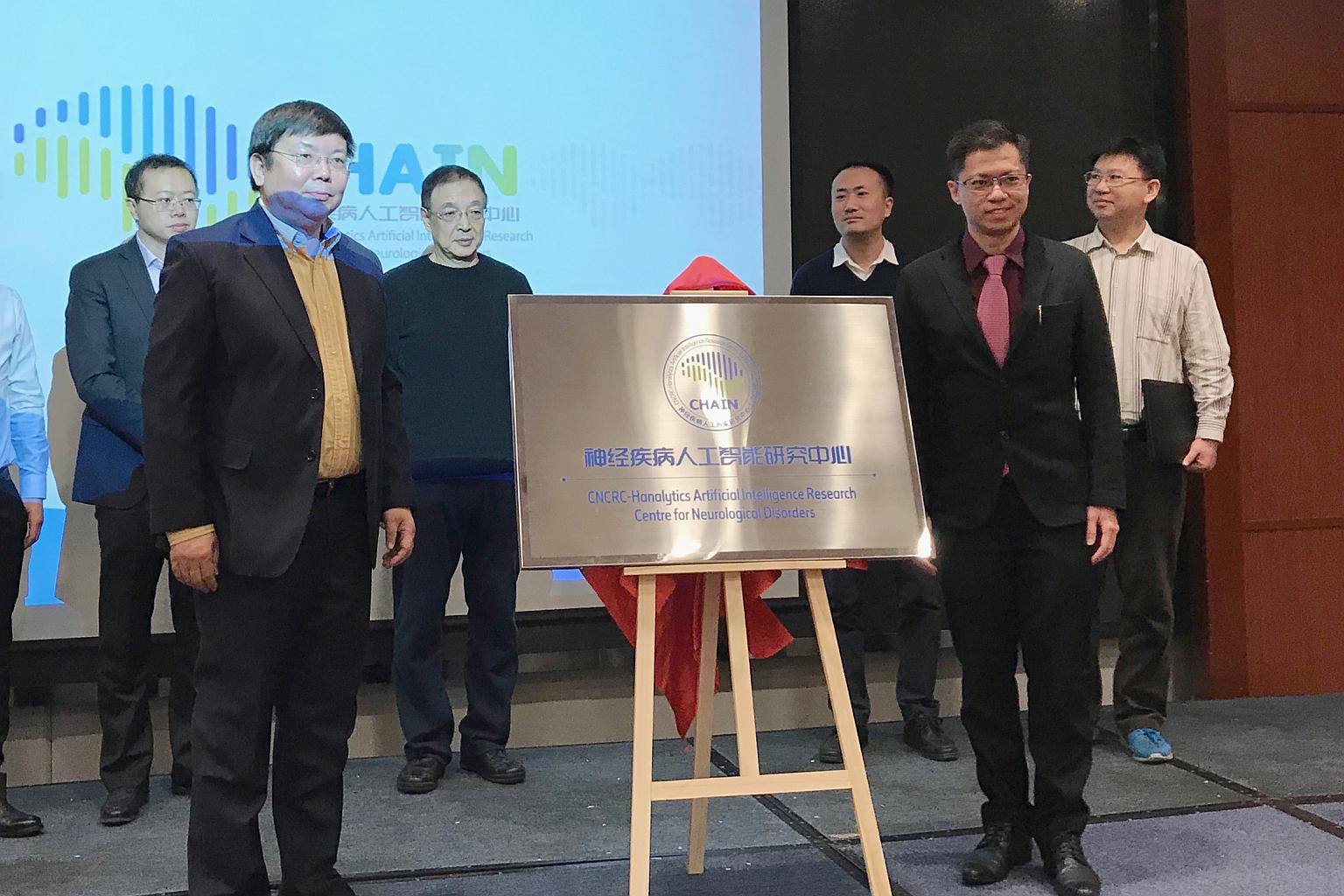Singapore firm sets up AI neurology research centre with renowned Beijing hospital
Sign up now: Get insights on Asia's fast-moving developments

Beijing Tiantan Hospital vice-president Wang Yongjun (left) and Hanalytics chief executive Raymond Moh (right) inked a cooperation agreement in Beijing on Dec 22, 2017.
ST PHOTO: CHONG KOH PING
Chong Koh Ping
Follow topic:
BEIJING - A Singapore start-up and a top Chinese hospital in Beijing have set up what they say is the world's first artificial intelligence (AI) research centre for neurology.
The centre aims to develop technologies that, for example, ensure efficient and consistent diagnosis of brain tumours and vascular diseases, and help patients recover faster through the use of robots.
Hanalytics, a company that focuses on AI applications in healthcare, will work with Beijing Tiantan Hospital, known for its neurosurgery expertise, to develop applications in diagnosis, prevention, prognosis, as well as patient rehabilitation using AI.
Beijing Tiantan Hospital vice-president Wang Yongjun and Hanalytics chief executive Raymond Moh inked the cooperation agreement in a ceremony in Beijing yesterday (Dec 22).
"We hope the skills of hospitals and doctors can gradually become more uniform through the help of AI," said Professor Wang, who is also the chief physician of the hospital's neurology department.
"In time to come, we won't have the situation where patients get a lousy medical outcome just because they went to a bad hospital, or they can only get a good one if they go to a good hospital. AI can help make up for this," he said.
Prof Wang said the new research centre will harness AI to develop new technologies covering areas including brain tumours, vascular diseases, gene protein analysis, patient rehabilitation, and clinical treatment of cerebrovascular disease.
The centre has already started developing medical imaging AI to assist doctors in their diagnosis of brain tumours.
In the next three to four months, the centre hopes to roll out a system where an AI software could be installed into the magnetic resonance imaging (MRI) scanners to generate reports within seconds after patients receive an MRI examination.
"Some 90 per cent of our patients come from outside of Beijing. They normally have to wait one day for the report as our doctors need time to read the images and write the reports. With AI, the doctors will only need to double check the machine-generated report. It can cut the workload by half and have higher consistency," said Prof Wang.
Mr Moh said the Beijing hospital has neurology experts with top quality skills and they treat a wide range of medical conditions that are considered rare even in a large country like China.
Getting the machines to apply deep learning can achieve excellent results in diagnosis accuracy and consistency, he added.
The collaboration will also benefit Singapore's scientists.
"We have a lack of data scientists in Singapore. And even with the small number that we have, we will need a platform for them to apply their skills after we train them. So this collaboration can give our Singapore talents a good platform to receive training overseas, and later transfer the learning back to Singapore, said Mr Moh, one of five founders of the fledgling company of 30 which was started in the beginning of this year (2017).
Hanalytics will send 20 scientists to Beijing for one year to work with the medical specialists at the new research centre.
Prof Wang said the collaboration is an exclusive one where Hanalytics will only work with BeijingTiantan Hospital in developing AI in neurology.
"We can only grow big and strong if we focus on doing just one thing. And we especially like Hanalytics for its international perspective.
"We are not satisfied to be the top hospital in China in the field of neurology and neurosurgery. We want to bring our team onto the global stage,'' he said.
Besides improving medical outcomes, AI can also help lower healthcare costs. Management consultancy McKinsey estimates that AI could help save up to US$300 billion (S$403 billion) a year in healthcare services in the United States, or about 0.7 per cent of the country's gross domestic product.
China has been quick to embrace AI in the healthcare sector, with strong backing from the government.
AI is used in areas such as remote care services, assisting diagnosis and treatment, and improving health management through wearable devices, said the National Health and Family Planning Commission in a report by state-run China Daily.
The private sector has also been active in developing AI applications in healthcare, with at least 131 companies, mostly in Beijing, Shanghai and Shenzhen, involved in the field, according to a report by research firm Yiou Intelligence.
All three tech giants - Baidu, Alibaba and Tencent - have also made notable investments in this area.

